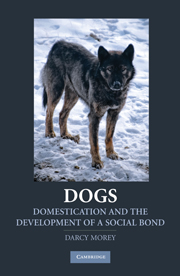Book contents
- Frontmatter
- Contents
- List of Figures and Tables
- Foreword
- Preface and Acknowledgments
- 1 Preamble to the Dog's Journey through Time
- 2 Immediate Ancestry
- 3 Evidence of Dog Domestication and Its Timing: Morphological and Contextual Indications
- 4 Domestication of Dogs and Other Organisms
- 5 The Roles of Dogs in Past Human Societies
- 6 Dogs of the Arctic, the Far North
- 7 The Burial of Dogs, and What Dog Burials Mean
- 8 Why the Social Bond between Dogs and People?
- 9 Other Human-like Capabilities of Dogs
- 10 Roles of Dogs in Recent Times
- Epilogue: One Dog's Journey
- Appendix A
- Appendix B
- References
- Index
10 - Roles of Dogs in Recent Times
Published online by Cambridge University Press: 05 August 2012
- Frontmatter
- Contents
- List of Figures and Tables
- Foreword
- Preface and Acknowledgments
- 1 Preamble to the Dog's Journey through Time
- 2 Immediate Ancestry
- 3 Evidence of Dog Domestication and Its Timing: Morphological and Contextual Indications
- 4 Domestication of Dogs and Other Organisms
- 5 The Roles of Dogs in Past Human Societies
- 6 Dogs of the Arctic, the Far North
- 7 The Burial of Dogs, and What Dog Burials Mean
- 8 Why the Social Bond between Dogs and People?
- 9 Other Human-like Capabilities of Dogs
- 10 Roles of Dogs in Recent Times
- Epilogue: One Dog's Journey
- Appendix A
- Appendix B
- References
- Index
Summary
When we think of dogs, we tend to think of animals that were selected for behavior performed in the service of people. Dogs pull sleds, guard property, herd sheep, guide the blind, track and retrieve game, and so on.
Coppinger & Schneider 1995: 22With that statement, Raymond Coppinger and Richard Schneider began their substantial treatment of the many ways in which different dogs have become specialized for the working tasks that they carry out. Among the different roles that dogs play in recent times, Coppinger and Schneider focused especially on certain ones. Specifically they dealt mostly with sled dogs, sheep dogs, and other herding or livestock-management dogs. The “and so on” from their passage captures the reality that these kinds of specialization are but a mere subset of the roles carried out by “working dogs,” the explicit target of their contribution to a broader collection of pieces about dogs. As with their contribution, there would be little point in even trying here to offer a comprehensive survey of the roles that dogs play in modern times. Of those that they highlighted, one, sled dogs, is clearly a role played in the past, emphasized here in Chapter 6. Another one, involving sheep dogs and other herding or livestock-management dogs, is largely restricted to recent times, since it involves livestock, and there is no way to know with certainty if prehistoric peoples with livestock used dogs with their stock, though it is logical to suppose that they may have at times.
- Type
- Chapter
- Information
- DogsDomestication and the Development of a Social Bond, pp. 226 - 244Publisher: Cambridge University PressPrint publication year: 2010



